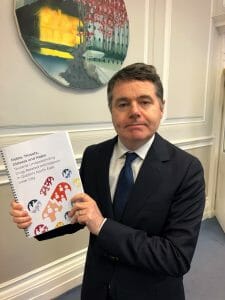Report highlights need to work together to address drug-related intimidation
January 26, 2021
Drug-related intimidation – such as attempts to recover drug debts or otherwise enforce discipline in drug markets through actual or threatened violence – is a complex issue that requires cooperation across the community to address effectively, according to a report today published by the Ana Liffey Drug Project. ‘Debts, Threats, Distress and Hope – Towards Understanding Drug-Related Intimidation in Dublin’s North East Inner City’ is the final report of the drug-related intimidation initiative, a project set up in September 2019 to look at the issue in the local area. The report reveals that over 4 in 5 respondents to an online survey aimed at those living and/or working in the NEIC area were aware of drug-related intimidation as an issue in the area, with over 1 in 5 reporting that they had experienced it themselves.

The report was formally launched by Minister for Finance, Paschal Donohoe TD, who as an elected representative for Dublin Central has a deep understanding of the area and the challenges inner cities face in the context of drugs, health and crime. Speaking at the launch today, Minister Donohoe commended the work of the project and noted the importance of including the voices of community members in the generation of policy solutions:
“This work has been carried out under the auspices of the North East Inner City Programme, an initiative I have championed since its formative stages and of which successive governments have been supportive. Many thanks to all involved on this important issue. We know that drug-related intimidation impacts on many people in Irish communities and this report contributes to our understanding of the problem and how it might be addressed. Equally, we know that this is not something that any one agency can do alone – it must involve cross cutting leadership and partnership from all agencies; and most importantly it must always involve the local community – for they are the people facing intimidation, and their voices are most important in informing how we can address it.”
Tony Duffin, CEO of the Ana Liffey Drug Project echoed Minister Donohoe’s comments, noting the impact of drug related intimidation on people’s lives and on the local community, as well as the complexity of DRI as an issue:
“It’s easy to think of drug-related intimidation as a purely transactional issue – people get into debt from drug use and then experience intimidation as suppliers seek to recover their money. However, what this work shows is that drug-related intimidation is more complex than this; and that in reality, even living in a location where dealing takes place can be sufficient for a person to become a target of intimidation. The sad truth is that many people do not feel safe in their communities, and this is something that we should all have an interest in addressing.”
The report makes a number of recommendations for addressing drug related intimidation in communities, including placing the community at the centre and making interventions as local as possible. Empowering communities to address issues like drug-related intimidation is an important part of regeneration, noted Michael Stone, Chair of the NEIC Programme Implementation Board, who also spoke at the event:
“From the very outset, the Mulvey report noted that regeneration must start at the core of the community, which means tackling crime, intimidation and drug abuse and creating a safe environment in which to live and work. The challenge now is to take meaningful steps towards considering and implementing the report’s recommendations. This is something the NEIC Programme Implementation Board will be focussed on in the weeks and months ahead.”




